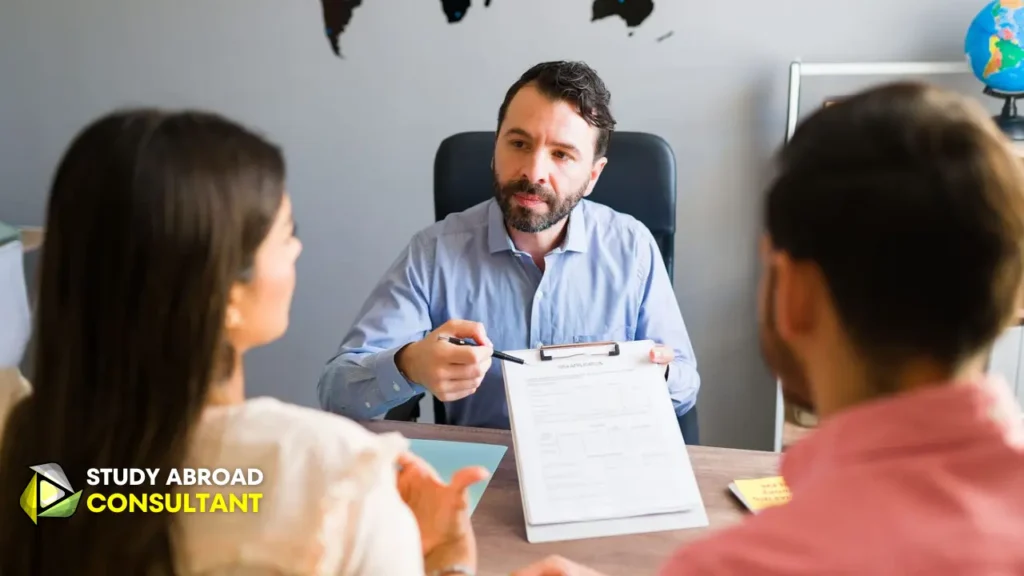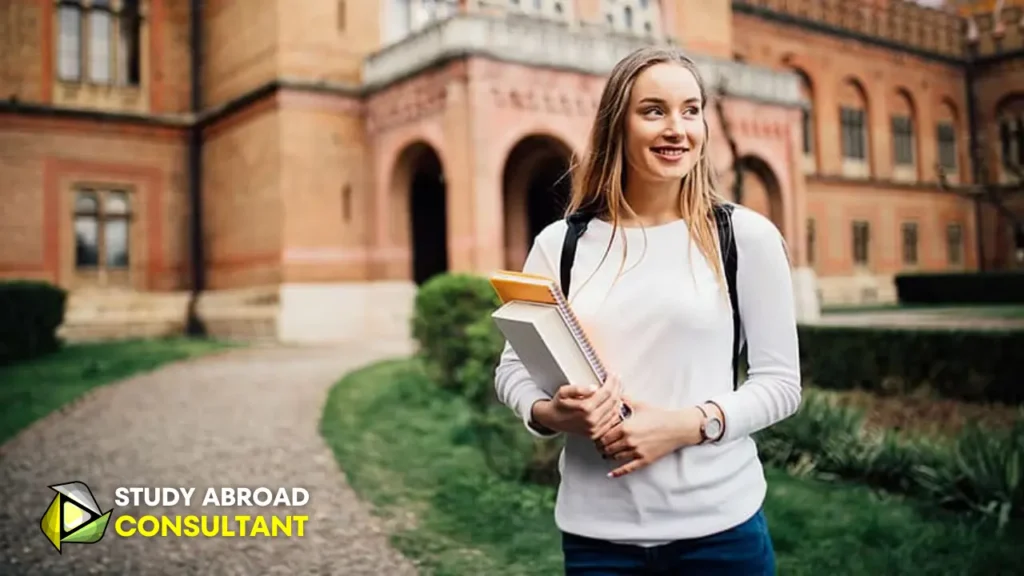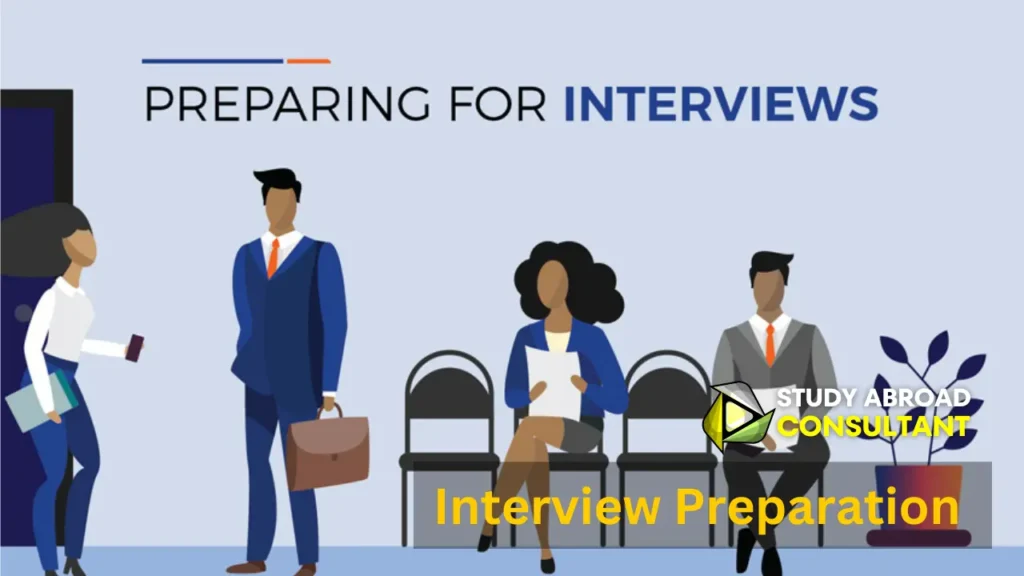For Pakistani students aspiring to study abroad, one of the crucial steps in the application process is the interview. This interview can be a deciding factor in securing admission to your dream university or obtaining a student visa. Proper interview preparation is essential to make a strong impression on the admission committee or visa officers. This comprehensive guide will walk you through the essential steps and strategies to effectively prepare for your interview.
Understanding the Purpose of the Interview | Interview preparation
The first step in Interview preparation is to understand why the interview is conducted. Whether it’s for university admission or a visa application, the purpose of the interview is to assess:
- Your Motivation and Goals: Why do you want to study abroad, and how does the program align with your career aspirations?
- Your Academic and Professional Background: Are you qualified for the program, and do you have the necessary skills and experience?
- Your Personal Qualities: Are you a good fit for the university or country, and how will you contribute to the academic community?
- Your Financial Stability: Can you financially support yourself during your studies?
- Your Intentions to Return: For visa interviews, they want to ensure that you intend to return to Pakistan after completing your studies.
Types of Interviews
1. University Admission Interview preparation
These interviews are typically conducted by university admissions officers or faculty members. They aim to evaluate your academic readiness, motivation, and fit for the program.
2. Scholarship Interview preparation
If you are applying for scholarships, you may be required to attend an interview to discuss your academic achievements, financial need, and how the scholarship will help you achieve your goals.
3. Visa Interview preparation
Visa interviews are conducted by consular officers at embassies or consulates. They focus on verifying your intentions, financial stability, and ties to your home country to ensure you will return after your studies.
Interview preparation Steps
1. Research Thoroughly
Before the interview, research the university, program, and country you are applying to. Understand their culture, values, and expectations. This knowledge will help you tailor your responses and demonstrate your genuine interest.
2. Review Your Application
Go through your application materials, including your personal statement, resume, and academic transcripts. Be prepared to discuss any aspect of your application in detail. Ensure that you can explain your motivations, goals, and any experiences mentioned.
3. Practice Common Interview preparation Questions
While you cannot predict every question, you can prepare for common ones. Here are some examples:
- Why do you want to study at this university?
- What are your career goals?
- Why did you choose this program?
- Tell us about your academic background and achievements.
- How do you plan to finance your studies?
- What are your plans after graduation?
Practice answering these questions concisely and confidently. Use specific examples to illustrate your points.
4. Interview preparation Questions to Ask
Interview preparation are a two-way street. Prepare thoughtful questions to ask the interviewer about the program, university, or country. This shows your genuine interest and helps you gather important information.
5. Mock Interviews Preparation
Conduct mock interviews with friends, family, or mentors. This practice will help you get comfortable with the interview format, receive feedback, and improve your responses. Record these sessions to review your body language and verbal communication.
6. Understand the Cultural Context
Cultural differences can influence interview expectations. Research the cultural norms of the country you are applying to and adjust your behavior and responses accordingly. For example, in some cultures, direct eye contact is a sign of confidence, while in others, it might be considered rude.
7. Dress Appropriately
First impressions matter. Dress in professional attire that is appropriate for the culture and context of the interview. Ensure your outfit is neat, clean, and conservative.
8. Organize Your Documents
For visa interviews, bring all necessary documents, including your passport, acceptance letter, financial proof, academic transcripts, and any other required paperwork. Organize them in a neat folder for easy access.

During the Interview
1. Be Punctual
Arrive on time or slightly early for the interview. Being punctual shows respect and responsibility.
2. Make a Good First Impression
Greet the interviewer with a firm handshake (if culturally appropriate), smile, and make eye contact. Introduce yourself clearly and confidently.
3. Listen Carefully
Pay close attention to the interviewer’s questions and comments. Listening carefully allows you to provide relevant and thoughtful responses.
4. Be Honest and Authentic
Answer questions truthfully and avoid exaggerating or fabricating information. Authenticity is valued and helps build trust with the interviewer.
5. Stay Calm and Confident
It’s natural to feel nervous, but try to remain calm and composed. Take deep breaths if you feel anxious. Confidence in your abilities and preparation will shine through.
6. Highlight Your Strengths
Use the interview as an opportunity to showcase your strengths, achievements, and unique qualities. Provide specific examples to support your statements.
7. Address Weaknesses Positively
If asked about weaknesses or challenges, acknowledge them honestly but also discuss how you are working to overcome them. Focus on your growth and resilience.
8. Ask Your Questions
Towards the end of the interview, when given the opportunity, ask your prepared questions. This shows your engagement and interest in the program or visa process.
9. Express Gratitude
Thank the interviewer for their time and consideration. A polite and appreciative attitude leaves a positive impression.

Common Challenges and How to Overcome Them | Interview preparation
1. Language Barriers
If English is not your first language, you might feel nervous about your language skills. Practice speaking English regularly, and consider taking language classes if needed. Use clear and simple language during the interview.
2. Nervousness
Feeling nervous is common, but too much anxiety can hinder your performance. Practice relaxation techniques such as deep breathing, visualization, and positive affirmations to manage your nerves.
3. Unfamiliar Questions
You might encounter questions you didn’t prepare for. Stay calm, take a moment to think, and answer to the best of your ability. It’s okay to ask for clarification if you don’t understand a question.
4. Technical Issues (for Online Interviews)
If your interview is conducted online, ensure your internet connection is stable, your device is fully charged, and your environment is quiet and free from distractions. Test your equipment beforehand to avoid technical glitches. so Interview preparation is important to understand whole process.
Post-Interview Follow-Up
1. Reflect on the Interview
After the interview, take some time to reflect on how it went. Note down any questions that were challenging and areas where you could improve for future interviews.
2. Send a Thank-You Email
Send a thank-you email to the interviewer within 24 hours. Express your gratitude for the opportunity and reiterate your interest in the program or visa. Keep the email concise and professional.
3. Stay Patient
The waiting period after an interview can be stressful, but it’s important to stay patient. Processing times vary, and universities or embassies will contact you with their decision in due course.

Conclusion
Proper interview preparation is key to making a strong impression and achieving your goal of studying abroad. By understanding the purpose of the interview, researching thoroughly, practicing common questions, and conducting mock interviews, you can enhance your confidence and performance. Remember to dress appropriately, stay calm, and be authentic during the interview. Following these steps will increase your chances of success and bring you closer to realizing your dream of studying abroad.
Also Read : Visa Filing Process for Pakistani Students
FAQs about Interview Preparation for Pakistani Students to Study Abroad
1. Why is the Interview preparation important in the study abroad application process?
The interview is important because it allows the admission committee or visa officers to assess your motivations, academic qualifications, personal qualities, and financial stability. It is a key component in deciding whether you are a good fit for the program or whether you will be granted a visa. so Interview preparation is very important .
2. What are common Questions during Interview preparation?
Interview preparation by practicing answers to common questions such as:
- Why do you want to study at this university?
- What are your career goals?
- Why did you choose this program?
- Tell us about your academic background and achievements.
- How do you plan to finance your studies?
- What are your plans after graduation?
3. What should I wear to the interview?
Dress in professional attire that is neat, clean, and conservative. Make sure your outfit is appropriate for the cultural context of the country you are applying to.
4. What can i do for Interview preparation?
Conduct mock interviews with friends, family, or mentors. Practice answering questions confidently and concisely. Record these sessions to review your body language and verbal communication.
5. What documents should I bring to a visa interview?
Bring all necessary documents, including:
- Passport
- Acceptance letter from the educational institution
- Financial proof (bank statements, scholarship letters, etc.)
- Academic transcripts and certificates
- Proof of health insurance
- Completed visa application form
- Passport-sized photographs
- Any other required paperwork
6. How can I manage nervousness during the interview?
Manage nervousness by practicing relaxation techniques such as deep breathing, visualization, and positive affirmations. Stay calm, composed, and confident during the interview.
7. What should I do if I don’t understand a question during the interview?
If you don’t understand a question, it’s okay to ask the interviewer for clarification. Politely ask them to repeat or rephrase the question.
8. How can I demonstrate my genuine interest in the program or country?
Show genuine interest by thoroughly researching the university, program, and country. Prepare thoughtful questions to ask the interviewer about the program, university, or cultural aspects of the country.
9. How important is body language during the interview?
Body language is very important as it conveys confidence, attentiveness, and professionalism. Maintain good posture, make appropriate eye contact, and avoid fidgeting.
10. What should I do if I face technical issues during an online interview?
Ensure a stable internet connection, fully charged device, and a quiet, distraction-free environment. Test your equipment beforehand. If technical issues arise, calmly inform the interviewer and try to resolve the problem as quickly as possible.
11. What questions should I ask the interviewer?
Ask questions about the program’s curriculum, faculty, student support services, campus facilities, and any specific interests or concerns you have. This shows your engagement and interest in the program.
12. How can I follow up after the interview?
Send a thank-you email to the interviewer within 24 hours. Express your gratitude for the opportunity, reiterate your interest in the program or visa, and keep the email concise and professional.
13. What are some common mistakes to avoid during the interview?
Common mistakes to avoid include:
- Providing inaccurate or exaggerated information
- Being unprepared or disorganized
- Showing a lack of interest or enthusiasm
- Arriving late for the interview
- Dressing inappropriately
14. How long does it take to receive a decision after the interview?
The decision timeline varies by university and embassy. It can take anywhere from a few weeks to several months. Be patient and avoid making travel arrangements until you receive a confirmation.
15. What should I do if my visa application is denied?
If your visa application is denied, review the denial letter to understand the reasons. Address any issues mentioned in the letter, and consider reapplying with additional supporting documents or seeking advice from a visa consultant.



